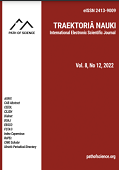In the Beginning: Chinese Cosmogonic Myths and Taoist Philosophy
In the Beginning: Chinese Cosmogonic Myths and Taoist Philosophy
Author(s): Tetiana DanylovaSubject(s): Philosophy, East Asian Philosophy
Published by: Altezoro, s. r. o. & Dialog
Keywords: Hundun; Cosmos; Wu Chi; Tai Chi; Tao; Heaven; Earth; Yin; Yang; Qi;
Summary/Abstract: The paper aims to analyse the Chinese cosmogonic myths, cosmogony, and cosmology elaborated by the ancient Chinese philosophers, particularly the representatives of Taoism. Chinese cosmogony and cosmology are most fully represented in philosophical texts, not mythological narratives. Chinese thinkers elaborated on the complex scheme of the emergence and development of the world. The source of the world's origin is not a transcendent external force. Just the opposite, this source is immanent and is based on the principle of constant changes. Chinese philosophers understood the universe as a continuous interaction of complementary forces. The interaction of complementary forces is the path of changes, i.e., the constant creation of the world and the flow of life processes. With special attention given to the Chinese Hundun myth and chaos-hundun concept, the author analyses "Tao Te Ching", "Zhuangzi", "Huaninanzi", and "Taijitu shuo".
Journal: Traektoriâ Nauki
- Issue Year: 10/2024
- Issue No: 1
- Page Range: 9001-9007
- Page Count: 7
- Language: English

